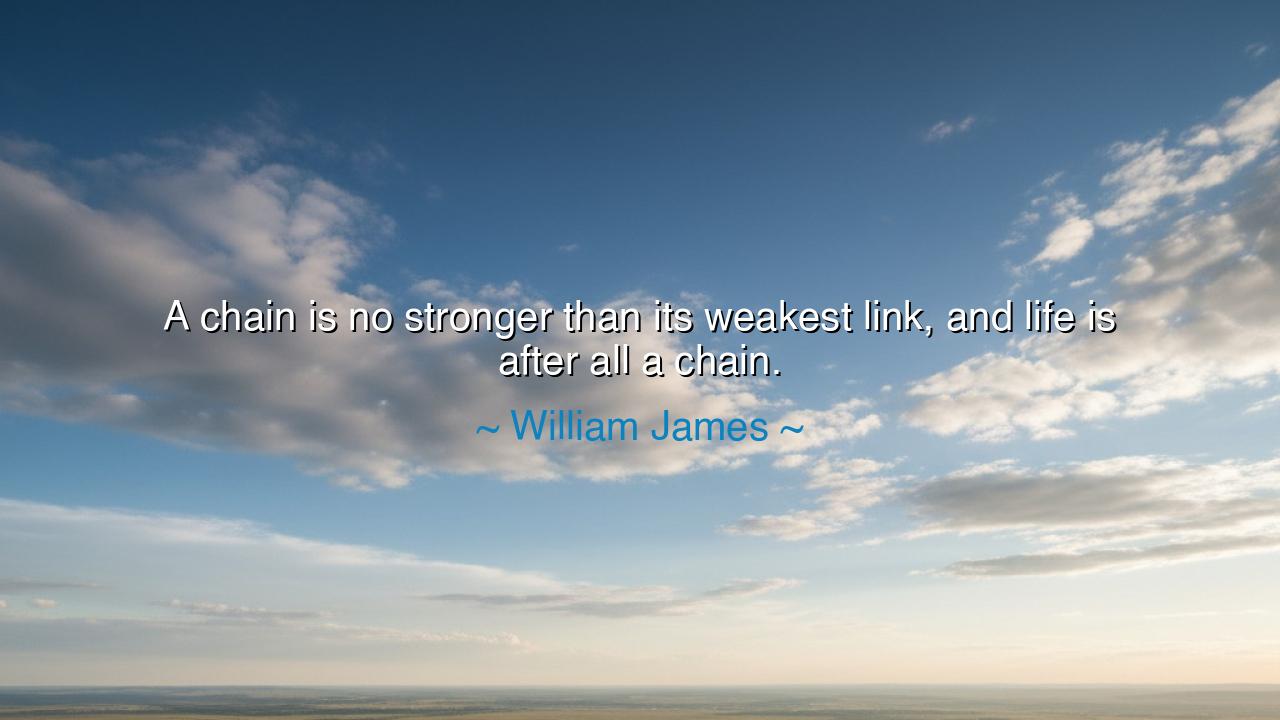
A chain is no stronger than its weakest link, and life is after






"A chain is no stronger than its weakest link, and life is after all a chain." These profound words by William James speak to the deep interconnectedness of life. They remind us that the strength of any system—whether personal, social, or cosmic—depends on the integrity of each individual part. A chain, though seemingly robust and resilient, is vulnerable at its weakest link, and so it is with life. Every experience, every relationship, and every action is a link in the chain of our existence, and if any link falters, the entire structure is weakened. James’s insight invites us to consider not just the grand moments of our lives, but the smaller, seemingly insignificant ones, for they too are integral to the strength and vitality of our journey.
This wisdom mirrors the philosophy of the Stoics, who believed that the whole of life is a tapestry of interconnected moments. Marcus Aurelius, the Stoic philosopher and emperor, often spoke of the importance of each individual’s role in the larger cosmic order. For Aurelius, life was like a chain, where each individual action, thought, and decision contributed to the greater whole. He would remind himself daily that his purpose was not isolated from the world around him, but deeply connected to it. Just as William James suggested, Aurelius understood that the strength of life depended on the integrity and quality of each moment, and if any part was neglected or weakened, it would reverberate throughout the entire journey.
In the story of Socrates, we find a striking example of this principle in action. Socrates’ life was marked by an unwavering commitment to virtue and wisdom, which he believed could guide society toward justice and harmony. His teachings emphasized the interconnectedness of all individuals, asserting that each person, no matter their station, contributes to the strength or weakness of the society. Socrates did not view his own actions in isolation; every conversation, every question he posed, was part of a greater chain of knowledge and understanding. When his life was cut short, his martyrdom did not diminish the impact of his beliefs. In fact, his death marked the strength of his convictions, and it was the integrity of his teachings that kept the chain of knowledge alive long after his passing.
Consider also the life of Mahatma Gandhi, who exemplified the power of an individual’s actions to influence the world. Gandhi’s philosophy of nonviolence and truth was built upon the understanding that each person, no matter their position or status, is a link in the larger chain of humanity. In his struggle for Indian independence, Gandhi’s commitment to self-discipline, humility, and justice formed the strongest links in the chain. But it was also the collective efforts of countless individuals, each contributing their efforts to the cause, that made the chain unbreakable. Gandhi understood that the integrity of the movement depended on the actions of each participant, no matter how small or seemingly insignificant their contribution. The strength of the movement lay in the unity of all its parts, working together toward a common goal.
In modern times, the global movement for climate justice offers another example of the chain theory in action. This cause, which connects individuals and communities across the world, depends on the actions of countless individuals—activists, policymakers, business leaders, and citizens. If one of these links weakens, whether through inaction, ignorance, or greed, it undermines the collective efforts to combat environmental degradation. However, when every link in the chain acts with purpose and integrity, the movement gains strength, pushing forward toward a more sustainable and just future. As William James said, the strength of life—whether in a movement, a society, or an individual—is determined by the strength of each link in the chain.
The lesson from James’s words is clear: life is not an isolated experience, but an ongoing series of interconnected moments, actions, and relationships. The quality of our lives—the strength of the chain of our existence—is shaped by how we approach each moment, how we care for each link in the chain. It is not enough to focus only on grand achievements or monumental goals; we must also pay attention to the small, seemingly insignificant actions, as they contribute just as much to the integrity of our journey.
In practical terms, this means we must act with intention and integrity in everything we do. Whether in our relationships, our work, or our personal growth, we should seek to strengthen each link, recognizing that our choices affect not only ourselves but the world around us. Every small act of kindness, every moment of self-discipline, every decision to act with virtue is a contribution to the strength of our lives and the world. By nurturing the strength of every link, we ensure the resilience of the entire chain, creating a life that is rich, meaningful, and connected to the greater whole.






AAdministratorAdministrator
Welcome, honored guests. Please leave a comment, we will respond soon